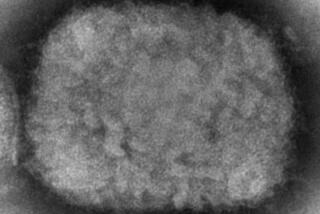1st U.S. Case of AIDS Via New Virus Found
- Share via
Doctors in New Jersey have discovered the first U.S. case of AIDS caused by a second AIDS virus first detected in West Africa more than two years ago, it was disclosed Wednesday.
Officials at the University of Medicine and Dentistry of New Jersey confirmed that an AIDS victim diagnosed there was infected with the virus, called human immunodeficiency virus-2 or HIV-2, but refused to release any details pending a press conference scheduled this morning.
But the victim is believed to have emigrated from or visited West Africa. In a prepared statement, university officials did say that no evidence existed that the patient had spread the virus to other people.
The discovery is expected to have no immediate impact on the extent or spread of AIDS in this country because HIV-2 is spread by the same activities as HIV-1, the virus believed to have caused all other AIDS cases in the United States and most other AIDS cases throughout the world.
AIDS, or acquired immune deficiency syndrome, destroys the body’s immune system, leaving it powerless against certain cancers and otherwise rare infections. It is commonly transmitted through anal and vaginal sexual intercourse, through the sharing of unsterilized hypodermic needles and by mother to fetus during pregnancy.
“There is still only one AIDS epidemic,” said Mathilde Krim, head of the American Foundation for AIDS Research.
But experts cautioned that the new virus is sufficiently different from HIV-1 that it may eventually be necessary to screen blood donations for it as is now done for HIV-1.
Could Affect Vaccine Effort
That difference could also complicate the effort to develop an AIDS vaccine if the new virus becomes widespread in the United States.
The new virus has been the subject of some controversy since it was discovered in 1985 by virologists Luc Montagnier of the Pasteur Institute in Paris and Myron Essex of the Harvard School of Public Health.
Montagnier has argued that HIV-2 is equal to HIV-1 in its ability to cause AIDS, but Essex contends that it is not as infectious and not as devastating to the immune system.
In one recent study of more than 4,000 men and women in six West African countries, Essex and his colleagues found that the infection rate of HIV-2 was high--nearing 50% in some groups, such as prostitutes--but that none of those infected actually had AIDS.
Last year, Montagnier predicted that HIV-2 will cause an epidemic in West Africa. Essex said it probably will not.
150 European Cases
About 150 cases of HIV-2 infection have so far been reported in Europe, according to Montagnier, but all of those cases involved West Africans, individuals who had visited the region or their sexual partners.
Montagnier also said recently that he had an unconfirmed report of an HIV-2 infection in Sao Paulo, Brazil.
Scientists have assumed that HIV-2 would eventually make it to this country. “It was inevitable,” Essex said Wednesday.
Researchers at the U.S. Centers for Disease Control recently used an experimental test for HIV-2 to screen more than 10,000 blood samples from blood banks and sexually transmitted disease clinics throughout the country. None of the samples tested positive.
In a related development, a team of researchers at Memorial Sloan-Kettering Cancer Center in New York City argue in today’s New England Journal of Medicine that all donated blood in the United States should be screened for a leukemia-causing virus that is related to HIV-1.
The team said they found the virus, called human T-cell leukemia virus type 1, in the blood of six of 211 leukemia patients who had received numerous transfusions. None of the six, however, had the type of leukemia caused by the virus.
More to Read
Sign up for Essential California
The most important California stories and recommendations in your inbox every morning.
You may occasionally receive promotional content from the Los Angeles Times.











